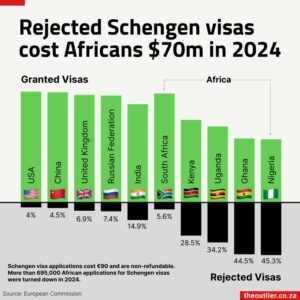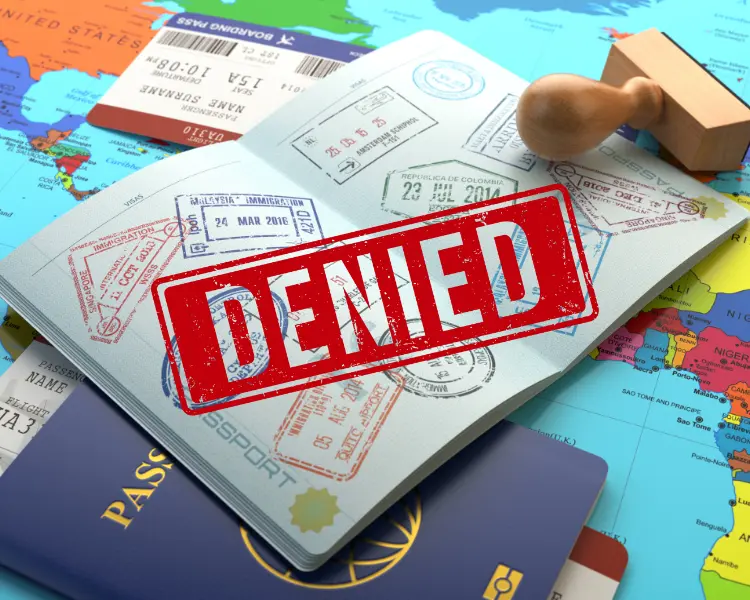In a sobering revelation, Africans collectively lost more than $70 million in non-refundable Schengen visa application fees in 2024, as rejection rates across the continent remain significantly higher than the global average.
According to data released by the European Commission, Nigerians bore the brunt of the financial loss, with over 45% of Schengen visa applications rejected — out of 111,201 applications, only 58,808 were approved. That translates to nearly $5 million lost by Nigerian applicants alone in the form of non-refundable fees.
Ghanaians followed closely, with a rejection rate of 44.5%, further contributing to the staggering financial burden placed on African travelers who must pay €90 (approx. R1,800 or $98) per application, whether approved or denied.
Pakistanis Also Face Harsh Scrutiny
While the focus remains on Africa, Pakistanis, too, are facing increasingly tough odds when applying for Schengen visas. Although official figures for 2024 are yet to be consolidated, estimates suggest tens of thousands of Pakistani applications have already been rejected, contributing to a growing sense of disillusionment and frustration among genuine travelers, journalists, and students.
In particular, the Polish Embassy in Pakistan has earned a reputation for being the toughest, with rejection rates reportedly among the highest in the Schengen zone. Many applicants claim rejections are issued with vague or generic reasons, raising concerns about transparency and fairness.

Is Schengen Visa Rejection Becoming an Industry?
With rejection rates climbing and the non-refundable nature of the €90 fee, critics are beginning to question whether Schengen visa rejections have become an industry in themselves. When aggregated across African and Asian countries, the revenue generated from unsuccessful applications runs into hundreds of millions of euros annually.
The average global rejection rate for Schengen visas stands at 16.9%, but African applicants face a much higher rejection rate of 27%, highlighting systemic imbalances in how visas are granted.
South Africans See Better Results — But Still Lose Millions
Interestingly, South African applicants fare significantly better, with only 5.6% of the 193,768 applications submitted in 2024 being rejected. However, even this relatively low rejection rate resulted in over $1 million (ZAR 19.7 million) in lost visa fees.
Why Is It Getting Harder?
Several factors are making it increasingly difficult to secure a Schengen visa:
-
Stricter scrutiny post-COVID and amid rising global tensions.
-
Overwhelming demand vs. limited appointment slots.
-
Heightened suspicion toward applicants from high-migration-risk countries.
-
Embassy-specific discretion, with some countries applying more rigorous vetting than others.
As travel remains an essential avenue for education, business, and cultural exchange, the increasing difficulty and financial risk of applying for a Schengen visa raises important questions about access, equity, and the true purpose of international mobility policies.



2 Comments
Pingback: Police arrest man for killing TikToker Sana Yousaf after rejection - Media Bites
Pingback: Lee Jae-myung sworn in as South Korea’s President after landslide election victory - Media Bites